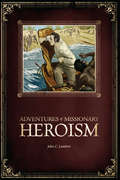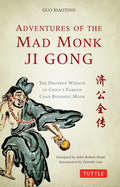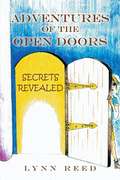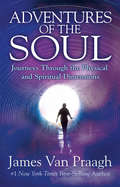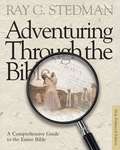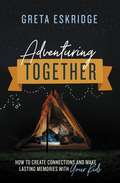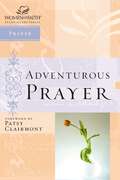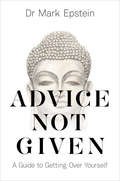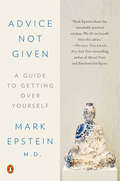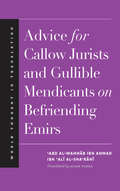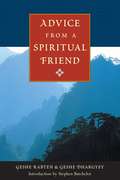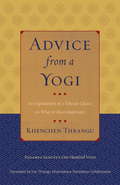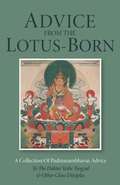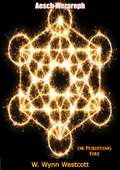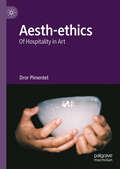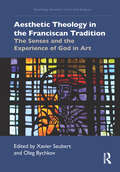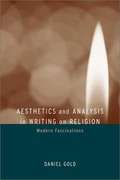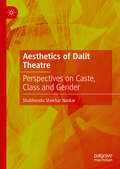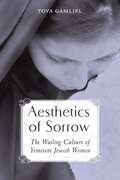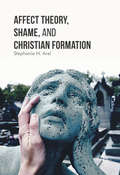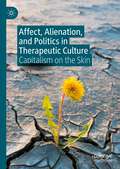- Table View
- List View
Adventures in Reading 3B (Third Edition)
by Kathleen Hynicka Amy Schoneweis Robin E. ScrogginsThe book contains developmentally appropriate selections from a variety of genres with a progression of difficulty in readability and skills to provide success for every student. New Bible retellings closely follow the text in Scripture.
Adventures of Missionary Heroism: True Stories Of The Intrepid Bravery And Stirring Adventures Of Missionaries With Uncivilized Man, Wild Beasts, And The Forces Of Nature In All Parts Of The World
by John C LambertBe inspired by stirring true accounts of famous missionaries! During the 19th century, many courageous and faithful missionaries were traveling to the ends of the earth to spread the Gospel. They braved innumerable dangers, toils, and tragedies. Originally published in 1912, each chapter within this volume is devoted to ). missionary and provides a biography, as well as stories of their time in the field. Meet over 20 inspiring individuals of faith Discover their call to missions service and their sacrifices Explore the dangers and challenges of these pioneering servants of Christ In addition, the book also highlights the work these believers accomplished, such as translating the Bible, providing medical aid, and converting people to Christianity. This book covers missionaries from around the world and from several different Christian denominations who served in Asia, Africa, North America, South America, and the Pacific. May these stories of those who have gone before inspire and encourage the current and future ranks of Christians, both young and old alike, to give everything for the sake of Jesus Christ.
Adventures of the Mad Monk Ji Gong
by Guo XiaotingFollow the brilliant and hilarious adventures of a mad Zen Buddhist monk who rose from humble beginnings to become one of China's greatest folk heroes! Ji Gong studied at the great Ling Yin monastery, an immense temple that still ranges up the steep hills above Hangzhou, near Shanghai. The Chan (Zen) Buddhist masters of the temple tried to instruct Ji Gong in the spartan practices of their sect, but the young monk, following in the footsteps of other great ne'er-do-wells, distinguished himself mainly by getting expelled. He left the monastery, became a wanderer with hardly a proper piece of clothing to wear, and achieved great renown-in seedy wine shops and drinking establishments! This could have been where Ji Gong's story ended. But his unorthodox style of Buddhism soon made him a hero for popular storytellers of the Song dynasty era. Audiences delighted in tales where the mad old monk ignored-or even mocked-authority, defied common sense, never neglected the wine, yet still managed to save the day. Ji Gong remains popular in China even today, where he regularly appears as the wise old drunken fool in movies and TV shows. In Adventures of the Mad Monk Ji Gong, you'll read how he has a rogue's knack for exposing the corrupt and criminal while still pursuing the twin delights of enlightenment and intoxication. This literary classic of a traveling martial arts master, fighting evil and righting wrongs, will entertain Western readers of all ages!
Adventures of the Mad Monk Ji Gong
by Victoria Cass Guo Xiaoting John Robert ShawFollow the brilliant and hilarious adventures of a mad Zen Buddhist monk who rose from humble beginnings to become one of China's greatest folk heroes!Ji Gong studied at the great Ling Yin monastery, an immense temple that still ranges up the steep hills above Hangzhou, near Shanghai. The Chan (Zen) Buddhist masters of the temple tried to instruct Ji Gong in the spartan practices of their sect, but the young monk, following in the footsteps of other great ne'er-do-wells, distinguished himself mainly by getting expelled. He left the monastery, became a wanderer with hardly a proper piece of clothing to wear, and achieved great renown-in seedy wine shops and drinking establishments!This could have been where Ji Gong's story ended. But his unorthodox style of Buddhism soon made him a hero for popular storytellers of the Song dynasty era. Audiences delighted in tales where the mad old monk ignored-or even mocked-authority, defied common sense, never neglected the wine, yet still managed to save the day. Ji Gong remains popular in China even today, where he regularly appears as the wise old drunken fool in movies and TV shows. In Adventures of the Mad Monk Ji Gong, you'll read how he has a rogue's knack for exposing the corrupt and criminal while still pursuing the twin delights of enlightenment and intoxication. This literary classic of a traveling martial arts master, fighting evil and righting wrongs, will entertain Western readers of all ages!
Adventures of the Open Doors: Secrets Revealed
by Lynn Reed[Back Cover and Bookmark:] "Shannon's AMAZING JOURNEY, in this book is of a young archeology student's adventure; that changes her life forever. As her class travels to dig sites, a series of mysterious events open hidden secrets of prophetic revelations, from ancient times to the present. Many archeological discoveries foretell the true existence of the people in the land of Israel that will teach young adults that God truly does exist! Empowered by her adventurous spirit, Shannon comes to unlocking secret doors that define the truth and future events which she has been researching." Even though the story and characters are fictitious, the author uses the fiction to reveal many Biblical doctrinal truths and authentic archeological facts. The author sites scriptural references to substantiate the Biblical insights that she expounds. Though the author wrote this book for adolescent and young adult audiences, older readers can enjoy her discussion of the archeological findings and her concise elaboration of Judeo-Christian doctrinal, historical, and prophetic material.
Adventures of the Soul: Journeys Through the Physical and Spiritual Dimensions
by James Van PraaghAdventures of the Soul is a manual for anyone who has ever questioned where they come from, why they are here, and where they go after they die. Sharing his intuitive experiences of communicating with the Spirit World for the past 30 years, internationally renowned medium James Van Praagh takes you on a spiritual sojourn to discover the unique design of your very own soul and explore its various adventures as it travels between worlds. You&’ll learn to open up your mind to your soul&’s unbounded wisdom and gain a bigger perspective on life and a better grasp of your significant part in it.This book will further assist you in understanding and recognizing the soul lessons you came back to Earth to learn, such as sorrow, forgiveness, grief, compassion, and joy. By utilizing this knowledge, you will come to identify your soul&’s intricacies and start to live a life that truly fulfills your soul&’s destiny: following the path of love.This is one journey that will force you to look at life and death in a completely different light!
Adventuring Through The Bible: A Comprehensive Guide to the Entire Bible
by Ray C. StedmanUnderstanding the Bible can be somewhat intimidating for laypersons. However, the new and improved edition of Adventuring Through the Bible is designed to give readers a thorough overview of the entire Bible in an easy and exciting way. Features more than 1,000 pages filled with outlines, themes, and applications to help the reader grasp the message of each book of the Bible. Provides the reader with a one-stop guide for studying and understanding God's Word.
Adventuring Together: How to Create Connections and Make Lasting Memories with Your Kids
by Greta EskridgeA modern, practical, and inspiring guide to creating deep heart connections with kids by regularly creating new experiences and intentional adventures together.Parents today complain of fragmented relationships with their kids. What parents yearn for--and their kids too--is deep, heart-to-heart connections. But how can parents compete with all the other noise fighting for their kids' attention?The answer, says Greta Eskridge, is to break free from regular routines and familiar comforts of home to experience new places and adventures--even if those adventures go awry. From simply reading a book together to going on an overnight backpacking trip, activities together provide unique and crucial bonding opportunities. Adventuring Together highlights Greta's stories of doing just that, includingan array of ideas for outdoor and indoor ventures,what to do when your finances are limited,and how to adventure if your family can't hit the hiking trail or spend the night at a campground. Giving readers the tools to make adventures happen, Adventuring Together is a step-by-step guide for parents--whether in the city or the country--to start building connections today that will last a lifetime.
Adventurous Prayer (Women of Faith Study Guide Series)
by ZondervanThese topical guides will deal with issues that women wrestle with today: God's Will, Living in Christ, Prayer, and Worry. Reaching an audience across race, socio-economic, denominational, and age boundaries, these guides will enhance the lives of women in America as they empower them in their weekly devotions. The study guides can be used for both individual and group settings. Women are asking good questions about their faith. With our study guides, we want to join them in their quest for knowledge and lead them in finding the answers they are seeking.
Advertencia Global: Detalles Proféticos Revelados
by Bill VincentAdvertencia Global por Bill Vincent Detalles Proféticos Revelados ¿Estás dispuesto a convertirte en un Centinela del Señor? ¿Estás dispuesto a convertirte en un centinela del Señor? En Advertencia Global, Bill Vincent nos insta a todos a pronunciarnos por los Estados Unidos. En un esfuerzo por buscar y eliminar la maldad que se ha calado hasta llevar a los lugares elevados de nuestra sociedad, Bill nos llama a cada uno de nosotros a pasar tiempo en oración y prepararnos para difundir las advertencias de Dios. Aléjate de los medios sociales. Apaga tu televisor. Busca en tu interior la palabra de Dios. Su palabra sola nos guía a la verdad, a los peligros de nuestra sociedad y al llamado a la acción. Cuando nuestro Señor haga sonar la alarma, ¿aceptarás su llamado? Emplea tu fe, alimenta tu alma y prepárate para su palabra. Toma tu ejemplar de este libro hoy. Género: RELIGIÓN / Vida Cristiana / General Género Secundario: RELIGIÓN / Vida Cristiana / Crecimiento Personal Idioma: Español Palabras Clave: Aborto, Homosexualidad, Estados Unidos, Obama Conteo de palabras: 40000 Extracto: Voy a empezar echando los cimientos de aquello de lo que Dios está hablando en cuanto a hacer sonar la alarma. Hemos de ser los centinelas del Señor y Dios nos está levantando para ello. Durante todo el verano tuvimos reuniones en el parque en Litchfield, Illinois, y Dios le habló de manera específica a nuestro Ministerio “Revival Waves of Glory” (“Olas de Avivamiento de Gloria”); dijo que habíamos de levantarnos como los centinelas del Señor. Hemos de ser aquellos que están de pie y observan y ven en el Espíritu y pueden decir la verdad. Hemos de pronunciarnos en nombre de los Estados Unidos. El verdadero patriotismo representado por los colores de nuestra bandera - rojo, blanco y azul - se manifestará a través de aquellos que se posicionan como los verdaderos centinelas del Seño
Advice Not Given: A Guide to Getting Over Yourself
by Dr EpsteinOur ego, and its accompanying sense of self-doubt, is one affliction we all share. And while our ego claims to have our best interests at heart, in its never-ending pursuit of attention and power, it sabotages the very goals it sets to achieve. In Advice Not Given, renowned psychiatrist and author Dr Mark Epstein reveals how Buddhism and Western psychotherapy both identify the ego as the limiting factor in our wellbeing and both come to the same conclusion: when we give the ego free rein, we suffer; but when it learns to let go, we are free.Our ego is at once our biggest obstacle and our greatest hope. We can be at its mercy or we can learn to mould it. Completely unique and practical, Epstein's advice can be used by all, and will provide wise counsel in a confusing world.
Advice Not Given: A Guide to Getting Over Yourself
by Mark EpsteinOur ego, and its accompanying sense of nagging self-doubt as we work to be bigger, better, smarter, and more in control, is one affliction we all share. And while our ego claims to have our best interests at heart, in its never-ending pursuit of attention and power, it sabotages the very goals it sets to achieve. In Advice Not Given, renowned psychiatrist and author Dr. Mark Epstein reveals how Buddhism and Western psychotherapy, two traditions that developed in entirely different times and places and, until recently, had nothing to do with each other, both identify the ego as the limiting factor in our well-being, and both come to the same conclusion: When we give the ego free reign, we suffer; but when it learns to let go, we are free. With great insight, and in a deeply personal style, Epstein offers readers a how-to guide that refuses a quick fix, grounded in two traditions devoted to maximizing the human potential for living a better life. Using the Eightfold Path, eight areas of self-reflection that Buddhists believe necessary for enlightenment, as his scaffolding, Epstein looks back productively on his own experience and that of his patients. While the ideas of the Eightfold Path are as old as Buddhism itself, when informed by the sensibility of Western psychotherapy, they become something more: a road map for spiritual and psychological growth, a way of dealing with the intractable problem of the ego. Breaking down the wall between East and West, Epstein brings a Buddhist sensibility to therapy and a therapist's practicality to Buddhism. Speaking clearly and directly, he offers a rethinking of mindfulness that encourages people to be more watchful of their ego, an idea with a strong foothold in Buddhism but now for the first time applied in the context of psychotherapy. Our ego is at once our biggest obstacle and our greatest hope. We can be at its mercy or we can learn to mold it. Completely unique and practical, Epstein's advice can be used by all--each in his or her own way--and will provide wise counsel in a confusing world. After all, as he says, "Our egos can use all the help they can get. "
Advice for Callow Jurists and Gullible Mendicants on Befriending Emirs
by Adam Sabra Abd al-Wahhab al-SharaniThis mirror for princes sheds light on the relationship between spiritual and political authority in early modern Egypt This guide to political behavior and expediency offers advice to Sufi shaykhs, or spiritual guides, on how to interact and negotiate with powerful secular officials, judges, and treasurers, or emirs. Translated into English for the first time, it is a unique account of the relationship between spiritual and political authority in late medieval / early modern Islamic society.
Advice from a Spiritual Friend
by Stephen Batchelor Geshe Rabten Geshe Dhargyey Sharpa Tulku Brian Beresford Gonsar Tulku"Do not wish for gratitude. Never strike at the heart. Now if you die, you will have no regrets." --The Seven-Point Thought TransformationLike wise old friends, two Tibetan masters offer down-to-earth advice for cultivating compassion, wisdom, and happiness in every situation. Based on practical Buddhist verses on "thought training" (lojong), Advice from a Spiritual Friend teaches how to develop the inner skills that lead to contentment by responding to everyday difficulties with patience and joy. Following Stephen Batchelor's introduction to the Kadamapa tradition that gave rise to these earthy, pithy instructions, Part One is a commentary by Geshe Dhargyey to Atisha's (982-1054) Jewel Rosary of a Bodhisattva. Part Two includes a commentary by Geshe Rabten to the famous Seven-Point Thought Transformation. First published in 1977, Advice from a Spiritual Friend is a Wisdom classic that has enriched readers in many editions over the years. As Batchelor says in his introduction, "These teachings are as applicable today as they were when Atisha first introduced them to Tibet."
Advice from a Spiritual Friend
by Geshe Rabten Geshe Dhargyey"Do not wish for gratitude. Never strike at the heart. Now if you die, you will have no regrets. " - The Seven-Point Thought Transformation Like wise old friends, two Tibetan masters offer down-to-earth advice for cultivating compassion, wisdom, and happiness in every situation. Based on practical Buddhist verses on "thought training" (lojong), Advice from a Spiritual Friend teaches how to develop the inner skills that lead to contentment by responding to everyday difficulties with patience and joy. Following Stephen Batchelor's introduction to the Kadamapa tradition that gave rise to these earthy, pithy instructions, Part One is a commentary by Geshe Dhargyey to Atisha's (982-1054) Jewel Rosary of a Bodhisattva. Part Two includes a commentary by Geshe Rabten to the famous Seven-Point Thought Transformation. First published in 1977, Advice from a Spiritual Friend is a Wisdom classic that has enriched readers in many editions over the years. As Batchelor says in his introduction, "These teachings are as applicable today as they were when Atisha first introduced them to Tibet. "
Advice from a Yogi: An Explanation of a Tibetan Classic on What Is Most Important
by Thrangu Dharmakara Translation Collab Khenchen Thrangu Padampa SangyeThe urgency of spiritual practice has seldom been as simply and powerfully conveyed as it is in Padampa Sangye's One Hundred Verses. This Tibetan Buddhist classic is an antidote to the tendency we all have to waste our precious human lives. Khenchen Thrangu's lively commentary on the text brings to light its subtleties and amplifies its applicability to our daily struggles, showing how an understanding of its teaching on impermanence is the key to working with common difficulties such as loneliness, craving, betrayal, competitive colleagues, or squabbling families. It speaks to us today as profoundly as it did to the people of Dingri, Tibet, to whom it was first addressed a millennium ago.
Advice from the Lotus-Born
by Erik Pema Kunsang Marcia Binder Schmidt Padmasambhava Tulku Urgyen Rinpoche" Don't mistake mere words to be the meaning of the teachings. Mingle the practice with your own being and attain liberation from samsara right now." PadmasambhavaPadmasambhava is the primary master of Vajrayana, the teachings for our time. Out of his great compassion and wisdom, he instructed his main disciple Yeshe Tsogyal to conceal terma treasures to be revealed at the destined time for future practitioners. The profundity of this advice is meant to be personally applied by all individuals in all circumstances. It is a classic work, which contains valid truth for anyone who sincerely wants to follow a spiritual path."The chief compiler of Padmasambhava's teachings was Yeshe Tsogyal, an emanation of a female Buddha. There may be some people who believe that only men can attain enlightenment, but her life is proof to the opposite. The awakened state of mind is neither male or female." Tulku Urgyen Rinpoche, from Introductory Teachings
Aesch Mezareph or Purifying Fire: A Chymico-kabalistic Treatise Collected From The Kabala Denudata Of Knorr Von Rosenroth
by W. Wynn WestcottThe Aesch Mezareph or Ash Metzareph is a Kabbalistic and Alchemical text originally known to persons of Western Culture from the Latin translation found in a fragmentary condition in the work entitled “Kabbala Denudata” by Knorr von Rosenroth, published at Sulzbach in 1677-84.The present volume is the translation into English, which was issued by W. Wynn Westcott in Vol. IV of his Collectanea Hermetica at the end of the 19th century.
Aesth-ethics: Of Hospitality in Art
by Dror PimentelThe question of hospitality is the most pressing question in contemporary thought: How can we host that which is utterly Other, that which resists all conceptualization, and thus disrupts the proper course of thought? In the current book, the discussion of hospitality is given a new conceptualization, and extended to the field of aesthetics: the event of hospitality does not occur in the face-to-face encounter with the other person, as Emmanual Levinas conceived of it, but rather in the encounter with the work of art itself. Writing about the event of hospitality—as it is eventuated in art—involves subverting the traditional precedence of theory over practice. This subversion is also evident in the indifference to traditional distinctions, such as those between poetry and visual art; modern art and classical art; international art and local art. Moreover, most of the artworks considered throughout are hybrid in character: they are suspended in the space between the visual and the verbal, whether they involve the verbal representation of a visual object (as in Rilke’s poem “Archaic Torso of Apollo”), or a visual representation of a verbal object (as in Anselm Kiefer’s work “Your Golden Hair Margarete”). The consideration of these and other works come together to give rise to a novel and original discourse on art that is termed “Aesth-ethics,” and which is presented for the first time in this volume.
Aesthetic Theology in the Franciscan Tradition: The Senses and the Experience of God in Art (Routledge Research in Art and Religion)
by Xavier Seubert Oleg BychkovThe book investigates the aesthetic theology embedded in the Franciscan artistic tradition. The novelty of the approach is in applying concepts gleaned from Franciscan textual sources to create a deeper understanding of how art in all its sensual forms was foundational to the Franciscan milieu. Chapters range from studies of statements about aesthetics and the arts in theological textual sources to examples of visual, auditory, and tactile arts communicating theological ideas found in texts. The essays cover not only European art and textual sources, but also Franciscan influences in the Americas found in both texts and artifacts.
Aesthetics and Analysis in Writing on Religion: Modern Fascinations
by Daniel GoldThis is a book that looks at contemporary challenges to studying and writing in religion, rethinking the discipline in a way that takes seriously both the aesthetic dimensions and its need for scientific discipline. Gold pursues a new line of thought about the art of religion, arguing for something he calls interpretive writing.
Aesthetics of Dalit Theatre: Perspectives on Caste, Class and Gender
by Shubhendu Shekhar NaskarSince Dalit theatre has not garnered as much recognition as the other genres of Dalit literature have, this book, being one of the pioneering works in the field, aims to highlight the genre within the framework of Dalit literature and the Dalit Movement in India. The discussion extensively delves into the historical background, context and aesthetics of Dalit drama and theatre from epistemological viewpoints. To illustrate the subtleties of caste, class and gender in the pan-Indian scenario, the book includes textual understandings of specific Dalit plays, available in English translation, originally written in Marathi, Tamil, Telugu, and Bengali, covering diverse regions of India. The inclusion of full-length interviews, conducted by the author, of all the living playwrights whose texts have been taken up for analysis, is another substantial facet of this study.
Aesthetics of Sorrow: The Wailing Culture of Yemenite Jewish Women
by Tova GamlielThe term "wailing culture" includes an array of women's behaviors and beliefs following the death of a member of their ethnic group and is typical of Jewish life in Yemeni culture. Central to the practice is wailing itself--a special artistic genre that combines speech with sobbing into moving lyrical poetry that explores the meaning of death and loss. In Aesthetics of Sorrow: The Wailing Culture of Yemenite Jewish Women, Tova Gamliel decodes the cultural and psychological meanings of this practice in an ethnography based on her anthropological research among Yemenite Jewish communities in Israel in 2001-2003. Based on participant-observervation in homes of the bereaved and on twenty-four in-depth interviews with wailing women and men, Gamliel illuminates wailing culture level by level: by the circles in which the activity takes place; the special areas of endeavor that belong to women; and the broad social, historical, and religious context that surrounds these inner circles. She discusses the main themes that define the wailing culture (including the historical origins of women's wailing generally and of Yemenite Jewish wailing in particular), the traits of wailing as an artistic genre, and the wailer as a symbolic type. She also explores the role of wailing in death rituals, as a therapeutic expertise endowed with unique affective mechanisms, as an erotic performance, as a livelihood, and as an indicator of the Jewish exile. In the end, she considers wailing at the intersection of tradition and modernity and examines the study of wailing as a genuine methodological challenge. Gamliel brings a sensitive eye to the vanishing practice of wailing, which has been largely unexamined by scholars and may be unfamiliar to many outside of the Middle East. Her interdisciplinary perspective and her focus on a uniquely female immigrant cultural practice will make this study fascinating reading for scholars of anthropology, gender, folklore, psychology, performance, philosophy, and sociology.
Affect Theory, Shame, and Christian Formation
by Stephanie N. ArelThis book addresses the eclipse of shame in Christian theology by showing how shame emerges in Christian texts and practice in ways that can be neither assimilated into a discourses of guilt nor dissociated from embodiment. Stephanie N. Arel argues that the traditional focus on guilt obscures shame by perpetuating the image of the lonely sinner in guilt. Drawing on recent studies in affect and attachment theories to frame the theological analysis, the text examines the theological anthropological writings of Augustine and Reinhold Niebuhr, the interpretation of empathy by Edith Stein, and moments of touch in Christian praxis. Bringing the affective dynamics of shame to the forefront enables theologians and religious leaders to identify where shame emerges in language and human behavior. The text expands work in trauma theory, providing a multi-layered theological lens for engaging shame and accompanying suffering.
Affect, Alienation, and Politics in Therapeutic Culture: Capitalism on the Skin
by Suvi SalmenniemiThis book contributes to research on therapeutic culture by drawing on longstanding ethnographic work and by offering a new theoretical reading of therapeutic culture in today's society. It suggests that the therapeutic field serves as a key site in which a number of contradictions of capitalism are confronted and lived out. It shows that therapeutic engagements are inherently ambivalent and contradictory, as they can be articulated and engaged with in many different ways and harnessed for diverse, and often contradictory, political projects. The book takes issue with the interpretation of therapeutic culture as merely individualising, depoliticizing and working in congruence with neoliberalism, and shows that therapeutic engagements may also open up a space for contestation and critique of neoliberal capitalism, animate collective action for social change and articulate alternative forms of life and subjectivities. The book will speak to a wide variety of audiences in the social sciences and will be of particular interest to those working in the fields of sociology, anthropology, critical psychology, cultural studies, gender studies, and critical social theory.

